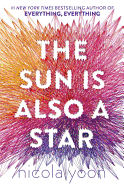
Nicola Yoon's The Sun Is Also a Star is a love story that feels timeless in its cosmic examination of what makes the human heart beat faster (think Keats) and yet is decidedly modern (think IKEA references, and the word "ass" used as an adjective).
The novel--named a finalist for the 2016 National Book Award for Young People's Literature--largely unfolds in the alternating first-person voices of two star-crossed lovers in New York City in the 12 hours following the moment they first meet. Seventeen-year-old high school senior Natasha Kingsley is a Jamaican-born black girl and "science geek" who lives in a cramped one-bedroom apartment in the Flatbush section of Brooklyn with her parents and younger brother. Daniel Bae, also 17, is the son of Korean immigrants who own a black hair care store in Harlem, a poet, and younger brother to the handsome, smug and bullying Charlie.
There are more than two sides to this story. Yoon (Everything, Everything) deepens her narrative with interruptions from an omniscient narrator who not only discusses multiverses, fate and the Jamaican word "irie," but also weighs in on everyone from a desperately lonely security guard named Irene (who disapproves of the swimming baby image on Natasha's Nirvana phone case) to Daniel's brother: "Daniel is right about Charles.... Some people grow out of their lesser natures, but Charles will not." This chorus of perspectives allows a compassionate, nuanced look at the cast of characters and their motivations. Compassion isn't always easy to muster. Natasha's father, for instance, said he regretted ever getting married and having a family. Back in Jamaica, Samuel Kingsley dreamed of finding fame and fortune as an actor in a Broadway musical, so he left his wife and daughter to do it... but didn't succeed. Two years later, his wife insisted on reuniting with him in America, came with Natasha on a tourist visa and stayed. Nine years later, he got drunk one night ("the night that ruined our lives"), crashed into a police car and told the officer that his family was in New York illegally. He was arrested, and the deportation date was set.
The very day that Natasha is scheduled to be deported, the desperate day she heads to a Manhattan immigration office to see if she can find some way to keep her family in America, is the day she crosses paths with Daniel Bae. Daniel--who has "poem-writing tendencies" but whose parents want him to go to Yale and be a doctor--is in the city wearing a suit and tie for a college admissions interview. He's sitting outside a church when he sees Natasha across the street with her "enormous, curly Afro and almost-as-enormous pink headphones." Could it be pure coincidence that the conductor on the 7 train was talking about God and here this music-absorbed, blissed-out girl is wearing a DEUS EX MACHINA jacket and walking into a record store called Second Coming Records? "I know now: it's definitely a Sign... I want to know where it leads," proclaims Daniel, following her into the store. Natasha and Daniel witness a theft, witty repartee ensues and sparks fly; that there's something between them--"something big"--is undeniable.
Daniel dives in heart-first, but Natasha must resist: "For one thing, I don't like temporary, nonprovable things, and romantic love is both temporary and nonprovable." Natasha knows too well what happens to dreamers like her father, so she has put all her faith in science, and is entertainingly rigid about it: "I wonder if she realizes how passionate she is about not being passionate," Daniel notes. He's clever enough to try to convince Natasha to love him "scientifically," even citing that actual New York Times article about how two people can fall in love by asking each other 36 personal questions, then staring into each other's eyes for four minutes. "Using science against me is smart," thinks Natasha, who likes this fine, funny, earnest boy way too much for a girl who's about to leave America forever.
Yoon chronicles the whirlwind romance and its myriad contexts--New York City, the world, the very universe--with great skill. The two teenagers have chemistry like "[a] lit match and dry wood." They flirt and spar, and even survive a full-on catastrophe when Daniel brings Natasha to his family's Black Hair Salon where her father sees her afro and says, "Hair too big," and Daniel's leering, jeering brother, Charlie, is even more of an "epic douche bag" than usual. As the day progresses, Natasha starts to budge on her theory that "love is just chemicals and coincidence," but what does it matter? Hour by hour, they are running out of time before Natasha's deportation, and Daniel doesn't even know it.
The Sun Is Also a Star is an exhilarating, hopeful novel about identity, fate, family, love, science, the love of science and the science of love, dark matter, God, life and much more, all meticulously interwoven in Yoon's surprisingly seamless narrative. It's about seeing and being seen, interconnectedness and the possibility of love... and it shines. --Karin Snelson

